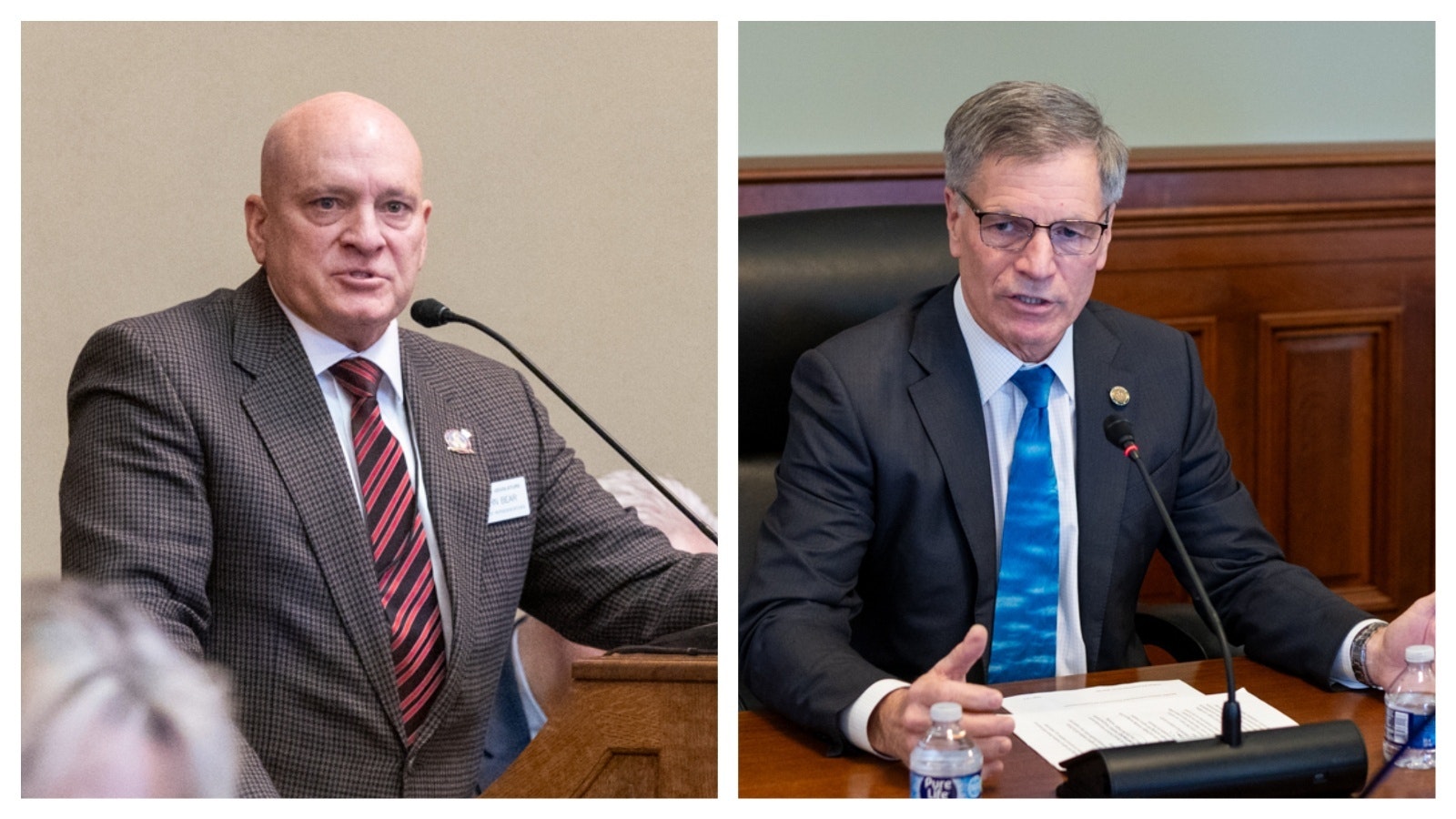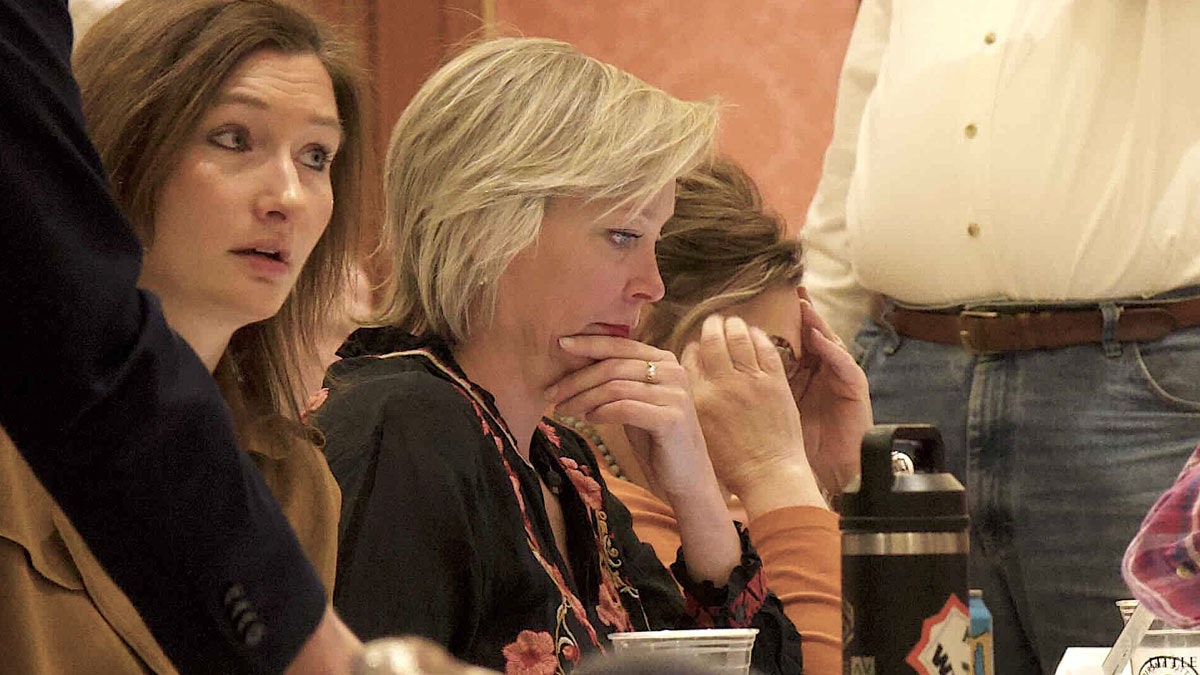The scene opens like archive footage from a rock and roll documentary.
It’s 2002, and Cheyenne’s McCormick Junior High School is hosting a talent show. The school buzzes with anticipation as Cross Town Rivals takes the stage.
Dominic Syracuse, clad in black-and-white knee-high socks pulled over his pants, grips his guitar and prepares to make “a punk rock statement.”
Mike Morris stands ready at the microphone. They've practiced for weeks in their buddy's garage, and they have a plan: Syracuse will slide across the stage for a guitar solo while Morris launches himself toward the crowd.
"We were just playing this cool punk rock, rock ‘n roll show,” Syracuse told Cowboy State Daily. “But when the moment arrives, everything falls apart.”
"Right away we could not hear each other on the stage," Syracuse recalled, bemoaning the lousy on-stage acoustics. "So we just all started playing randomly, just random sounds and noises and things like that."
Morris described the chaos: "I think I was like swinging a microphone on stage, and the microphone came off.”
Then came the grand finale.
"After clunking through the song, it was time for the big solo," Syracuse said. "So I slid on my knees and started doing the solo, and then Mike jumped off the stage and ripped the microphone cord in half."
As the band members shuffled off stage, their American history teacher Eric Crock was there to greet them. His assessment of their performance was succinct.
“Mr. Crock just kind of looked at me and shook his head,” said Morris. Crock then acknowledged the effort and the moment. He looked at Morris and said, “rock ‘n roll.”
That was more than 20 years ago.
Today, Crock still keeps in touch with Syracuse, Morris and other students he taught at McCormick, including local standup comic Rhianna Brand.
The enduring friendship with their teacher and love for performing locally turned the tables on Crock.
They were once enthusiastic audience members in Crock’s classroom. Now, it’s common for them to look out on their audiences and spot Crock laughing, clapping and maintaining a genuine bond worth recognizing.
Morris, Syracuse and Brand explained that now, more than ever, as social media and the divisive politics of these times continue to rip fissures of division throughout communities, it's inspiring to know your eighth grade history teacher still has your back.
Pizza Hut Dropout
Crock's journey to teaching began under the large, iconic red roof of the Pizza Hut in Lafayette, Colorado.
"I was teaching young people how to make pizza and wait tables," he said. "Every promotion I got, I was further and further removed from that. Every step that I got away from teaching young people how to make pizzas was less enjoyable for me.
"So I did some soul searching and decided that the happiest I was was when I was actually — and the key word is teaching — young people."
Crock describes his Pizza Hut years as “a bad career choice” that became a teachable moment. He went on to the University of Colorado and Colorado State University before landing at McCormick.
"The very first day that I ever subbed there, I knew that was where I wanted to spend the rest of my career," he said. "There was a feeling of camaraderie amongst the teachers. There was cooperation with the students, and it was just a really good fit."
Crock’s students remember he had a unique way of making history come alive, especially when it came to music.
"I learned a lot in his class about U.S. history, the things you're supposed to learn, like about Abraham Lincoln and stuff. But I also learned about, like, Sly and the Family Stone and The Ramones and things like that, which was awesome,” said Syracuse.
Morris recalled the experiential learning that defined Crock's classroom.
"We had a project that was almost like you had to become like the storyteller and role play," Morris said. "I was a saxophone player in the band, and so I learned a bunch of Civil War tunes that had originated from that time with military bands. And I actually performed it in class."
Crock was constantly drawing his students into different kinds of experiential learning.
"When we would learn about the Donner Party, which was typically late December, just before Christmas time," Crock said. "I had a door to the outdoors in my classroom, and I would open the door up and let the snow blow in and let it get cold.
"I told the kids ahead of time that we were going to do it, so bring your coat. If we're learning about people that are suffering and freezing to death, we ought to be at least be a little bit chilly.”
Flash 4 Life Sign
One person puts up four fingers. The other forms the letter L with a thumb and pointer finger.
This is Crock’s routine and tradition with the many former students he continues to bump into around Cheyenne.
The ritual traces back to professional wrestling.
"4 Life is a reference to the New World Order Pro Wrestling faction, which was in the 1990s — Hulk Hogan, Kevin Nash and Scott Hall," Morris explained. "Mr. Crock and these other two teachers, they played out the role of the New World Order of McCormick, so to speak. The catchphrase of that group was '4 Life,' and so Mr. Crock has integrated that into his photos."
For Brand, the meaning runs deeper.
"He just said, ‘You're my student. I need you to do an L.' I'll give the four because we're in each other's lives for life," Brand said. "I mean, he's gone past being a teacher. He's definitely a role model and someone that we can all count on in life."
Such relationships are nothing new in Wyoming, but how we understand these bonds continues to grow.
According to a 2025 report published in “Educational Psychology Review,” positive teacher-student relationships are key for motivation, providing students with a sense of stability and connectedness.
Students who experience more positive relationships with their teachers are more likely to enjoy school and set more challenging academic goals.
“Teachers serve as a critical point of connection during a developmental period where students' social ecosystems with peers become more complex, their parent/guardian relationships become more stressful, and they experience substantial changes in learning contexts, academic goals, and personal identity,” according to researchers.
At McCormick, Crock tried to become “a critical point of connection” for all of his students, long after each one turned in their final exam.
Friends for Life
After moving on from McCormick to Cheyenne Central High School, Dominic Syracuse played in a band called The Insulted.
The group stuck together as the members moved on to the University of Wyoming but eventually broke up after chasing a record deal that took them to Portland, Oregon.
Through it all, Syracuse turned to Crock for advice and inspiration, especially after he moved to Los Angeles to pursue a career as an actor and standup comic.
Syracuse said he was clearly moved by Crock’s example when the aspiring actor took a job teaching drama to inmates in a maximum-security prison.
Then, when it was time for Syracuse to film his first hour-long comedy special, "I wanted to film it at the Atlas Theatre in Cheyenne because that's my hometown. I was living in LA at the time. I came back just to shoot this special, and Eric and (Crock’s wife) Donna were right there in the front row, just right there the whole time."
“I hosted a movie trivia at a bar, and they were there,” added Syracuse. “I feel like I could be performing live at a garage sale, and they would be the first ones to show up."
"He was constantly uplifting us," Brand remembered, describing her time in Crock’s classroom. "I did not have the best of childhood. Having him checking in on me in class. Are you doing okay? How are you feeling today, Rhianna? He could sense that something was wrong.’ It's really nice to have another adult that's like, ‘Hey, how are you?’”
Mike Morris, who played saxophone in that Civil War project, went on to the honors program at the University of Wyoming and worked for the Denver Broncos before returning to Cheyenne.
Now a singer-songwriter and sponsorship manager for City of Cheyenne community events, he credits Crock with teaching him something fundamental about how to approach challenges.
"What I found most beneficial about my education experiences is that they made learning and eventually the work that's associated with school — they made it fun," Morris said. "I think that's in my experience been very important in a lot of the career progress I've made, no matter what I've been doing, is that I've tried to make it fun and have fun with it and really look at the lighter sides."
Why It Matters
Morris, Brand and Syracuse were all interviewed separately for this story. Unprompted, they all offered similar responses to questions about why now is a good time to profile a guy like Crock.
“You turn on the news and there's people fighting, all over social media, the political divide,” said Brand, who works for Meals On Wheels in Cheyenne. “There's a lot of discourse going on and it doesn't matter what political or religious affiliation — what your beliefs are at this point. He just really cares, you know?”
“He's in our lives for life. People need the feel-good stories, too," she added.
Morris agreed: "That’s sort of a theme of human connection right now. I think it's pretty important."
Syracuse's wife, Sheree, who didn't have a teacher like Crock growing up, often talks about what she missed.
Syracuse told her, “Well, you get to hang out with us now."
“The relationship that I have with my students is stronger than ever,” Crock said, who’s been retired for a few years now.
“We all have very different political views, but we all respect the fact that we spent nine months together and it was more than just learning U.S. history,” he said.
Next Wednesday, Brand will celebrate her 40th birthday at the Lamp Lounge in Cheyenne, where her friends in the local comedy community plan to roast her. Amid the whistles, clapping and laughter, there’s a good chance she’ll hear Mr. Crock.
David Madison can be reached at david@cowboystatedaily.com.















